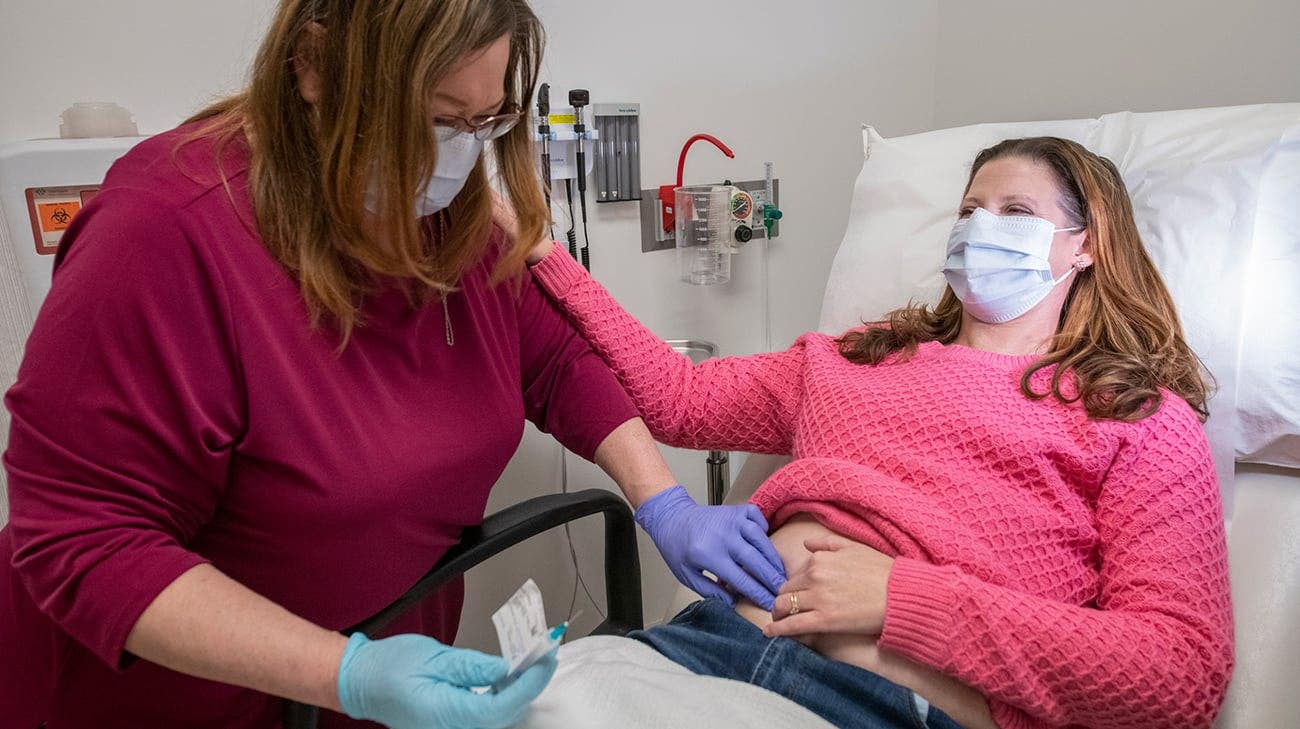Breakthrough breast cancer vaccine stops tumors before they start
A new breast cancer vaccine shows strong immune responses and no major side effects in early trials, offering hope against TNBC.

Research nurse coordinator Donna Lach administers the third dose of the breast cancer vaccine to Jennifer. (CREDIT: Cleveland Clinic)
A new kind of vaccine is changing how people think about preventing breast cancer. Not just any breast cancer—this one targets triple-negative breast cancer (TNBC), the most aggressive and hardest to treat. Unlike other vaccines, it doesn’t just help the immune system respond after cancer shows up. It teaches your body to stop cancer before it even starts.
At the heart of this bold effort is a vaccine developed through a partnership between Anixa Biosciences in San Jose, California and the Cleveland Clinic.
After decades of research and a recent clinical trial, the results are now being called “incredibly promising.” The vaccine works by training your immune system to recognize and destroy specific cancer-linked proteins before they can grow into tumors.
A Different Kind of Protection
Most vaccines you’ve heard of are designed to prevent infectious diseases. This one is different. It targets a protein called alpha-lactalbumin. This protein is normally found in breast tissue during lactation but reappears in many TNBC tumors. If your body learns to recognize this protein as a threat, it may stop those cancer cells before they spread.
That’s the idea behind the vaccine, and it’s showing real signs of success in early trials. Sixteen women took part in the first phase of testing. All had already completed treatment for TNBC. They received three doses of the vaccine over a span of six weeks. Doctors measured signs of immune activity through increases in key markers: IFNγ and IL-17, both of which suggest T-cell activity, and specific antibodies that signal a strong immune defense.
By Day 14, levels of IL-17 had risen sharply. By Day 56, IFNγ levels had also increased significantly. In total, 12 out of the 16 women showed clear T-cell responses that met the trial’s strict standards. These results suggest the vaccine is doing what it was designed to do—stimulate a strong immune reaction against potential cancer cells.
No Major Side Effects
Even more encouraging is how well patients tolerated the vaccine. The maximum tolerated dose—10 micrograms of alpha-lactalbumin combined with 10 micrograms of zymosan—caused only mild irritation at the injection site. There were no flu-like symptoms, no muscle aches, and no troubling lab results. This is a critical step forward for any new vaccine.
Related Stories
Dr. G. Thomas Budd, a staff physician at the Cleveland Clinic Cancer Institute and principal investigator of the study, presented the findings at the Society for Immunotherapy of Cancer (SITC) Annual Meeting. “There is a large unmet need for preventing TNBC,” Budd said. “We are encouraged by the data gathered to date.”
The Phase 2 study trial is expected to commence this year and is projected to last approximately two to three years. Immunological responses to the vaccine will be made available as the trial advances, providing a faster and more cost-effective path toward potential approval and/or partnerships with pharmaceutical companies.
"We are excited to unveil our Phase 2 study plan, bringing us one step closer to a potentially transformative therapy for breast cancer patients," said Dr. Amit Kumar. "By targeting treatment rather than prevention, we can reach a broader patient population and potentially expedite the process of regulatory approval and partnerships. This trial marks a key milestone in advancing our mission to fight cancer through innovative therapies. While our Phase 2 trial focuses on the therapeutic market, with the data obtained in this trial, we expect to conduct additional, more informed studies for both recurrence prevention and primary prevention with partners in the future."
One Woman’s Brave First Step
Jennifer Davis became the first person in the world to receive this vaccine in October 2021. Her story began three years earlier, when she sensed something wasn’t right despite an early biopsy that showed no signs of cancer. She pushed for more testing and, at 41, was diagnosed with TNBC. With no family history of cancer, she underwent chemotherapy, a double mastectomy, and radiation.
After reaching remission, she joined the clinical trial at Cleveland Clinic. Davis, a registered nurse, felt confident joining after hearing about the vaccine’s success in animal trials. “That was all I needed to hear,” she said.
“This is how we advance medicine,” Davis said. “It’s important to be a part of those things. I am just beyond grateful.”
Tragically, on January 31, 2024, Jennifer Davis delivered heartbreaking news to those closest to her: her cancer had returned.
She urged her friends not to lose momentum in their advocacy. “She said, ‘I had the lowest dose. Do not let this stop your efforts. There are so many women out there that we need to save.’”
In her darkest hour, Jennifer remained focused on the bigger mission: advancing the research and getting the breast cancer vaccine to the women who still had a chance.
Jennifer’s friend, Laura Frank, emphasized how much she believed in the vaccine’s potential. It took 20 years just to reach the human trial phase, and Jennifer proudly became the very first recipient.
“I think she was meant to receive that first dose,” Laura said. “She was so strong, so positive, and she believed there was something else out there.” Though she understood the early-stage trial was just the beginning, Jennifer held onto hope—not just for herself, but for the future of countless others.
Sadly, on April 13, 2024, Jennifer passed away.
A Long Road to a Breakthrough
The roots of this vaccine trace back more than 20 years. Much of the early science was developed by the late Dr. Vincent Tuohy at Cleveland Clinic. Years later, Dr. Amit Kumar, CEO of a biotech company called Anixa Biosciences, saw the early data and immediately recognized the potential. “I looked at it and I saw the vision,” he said.
Kumar and his team partnered with the Cleveland Clinic and secured funding from the U.S. Department of Defense to run the Phase 1 trial. They are now implementing the Phase 2 study involving 600 women. In this trial, half will receive the vaccine and the other half will receive a placebo. If successful, the researchers hope to win FDA approval within five years.
“This vaccine is designed to direct the immune system to destroy TNBC cancer cells through a mechanism that has never previously been utilized for cancer vaccine development,” Kumar said. “Our goal is to initially evaluate the vaccine’s ability to prevent recurrence of cancer in survivors, and continue with extension studies to eventually determine its effectiveness in preventing the initial onset of TNBC.”
When asked if the vaccine teaches the body not to grow tumors, Kumar responded, “That’s exactly right. It’s teaching your body to destroy the cells that can grow a tumor.”
A New Way to Think About Cancer
The human immune system is excellent at fighting off viruses and bacteria. But cancer is harder to stop because it begins in your own cells. “All of the cells that become cancerous in your body came from normal, healthy cells,” Kumar explained. “The difference is not big, so the immune system has a harder time recognizing a cancer cell and distinguishing it from a healthy cell.”
By focusing on alpha-lactalbumin, which is not present in normal breast tissue after lactation, the vaccine gives the immune system a clearer target. This approach could lead to a future where breast cancer, especially the aggressive triple-negative kind, is not just treatable—but preventable.
With thousands of lives lost to breast cancer every year in the U.S., and one in eight women at risk of developing the disease, the stakes are high. This new vaccine offers a powerful step toward reducing that number. And for women like Jennifer Davis, it offers a reason to hope.
As more patients enroll and new data comes in, researchers are cautiously optimistic. “We are pleased with our progress,” said Kumar. “This vaccine could potentially eliminate breast cancer.”
------ Update made on Apr. 10, 2025 ------
The story was updated with the sad news of Jennifer Davis' passing on April 13, 2024 and the heartfelt sentiments from her friends.
------------------------------------------------
Note: The article above provided above by The Brighter Side of News.
Like these kind of feel good stories? Get The Brighter Side of News' newsletter.



